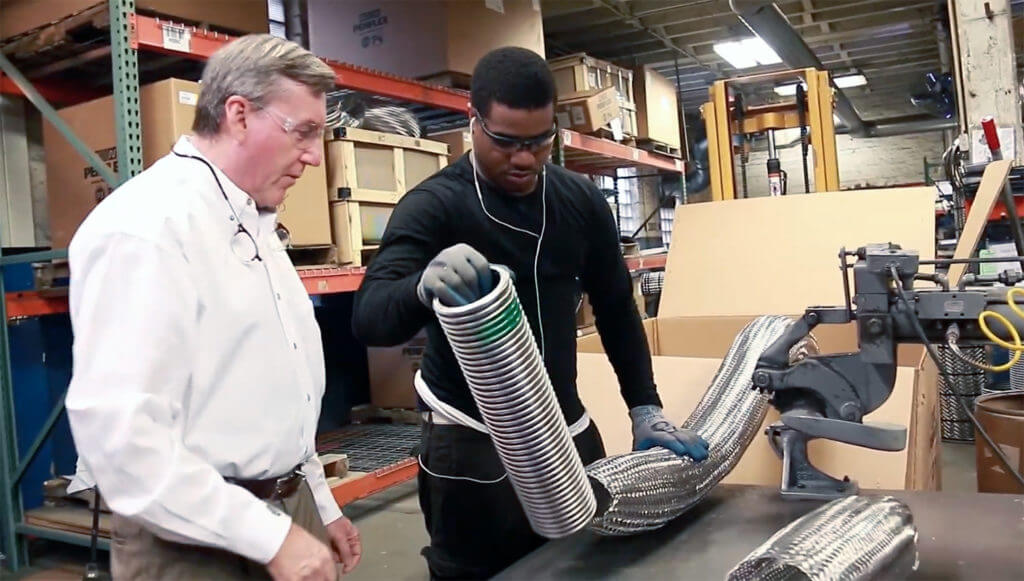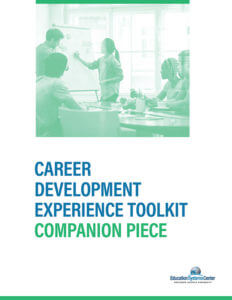Recent investments into Illinois’ Youth Career Pathway program reflect the need to provide meaningful training, support, and mentorship to address the significant barriers youth ages 16–24 face in accessing and staying connected to a meaningful college and career pathway. In 2020, the youth unemployment rate nearly tripled, and challenges continue as businesses struggle to recover, especially in the service industry where youth typically work. Research from Murillo et al., (2017) describes how work-based learning opportunities such as career development experiences can provide the capital and opportunity to help young people acquire the skills and knowledge needed to navigate the work and educational environment typically inaccessible to marginalized student populations. Through connection to meaningful work-based learning and training, youth are connected with advisors, including industry professionals who help provide the information, guidance, and access to resources that can get them reconnected on a pathway that leads towards a sustainable career.
In collaboration with the Illinois Department of Commerce and Economic Opportunity, Education Systems Center has released a new Career Development Experience Toolkit Companion Piece. The document is meant to be viewed in tandem with our Career Development Experience Toolkit released in fall 2019, which adheres to the framework of the Postsecondary and Workforce Readiness Act for College and Career Pathway Endorsements. While these materials adhere to the CCPE framework for high school students, they are also meant to serve any organization that seeks to provide rigorous work-based learning opportunities to youth. Career development experiences are part of Illinois’ broader work-based learning continuum and refer to a broad array of experiential learning that address the components included in the statutory definition of the Career Pathways Dictionary.
The purpose of this extension is to explore career development experiences and provide resources to address the needs of stakeholders outside of a traditional high school setting, including workforce development organizations, community-based organizations, and alternative high schools that support opportunity youth. This companion piece seeks to address disparities that are the result of systemic racism, which intentionally provides access and opportunities to white, affluent families while stifling the potential of low-income people and Black, Indigenous, and People of Color (BIPOC). Even more, the impacts of COVID-19 disproportionately affect young adults and young adults of color, aggravating these inequities. To that end, it is critical that community-based organizations, employers, and education providers connect youth who have been historically pushed to the margins with meaningful connections to careers.
Inside the Career Development Experience Toolkit Companion Piece
The Companion Piece includes:
- Community, host-led, and national models and considerations for ensuring success for opportunity youth, including a discussion of common barriers and solutions for engaging opportunity youth.
- Recommendations for supports and services during and after career development experiences to ensure that an explicit connection to further resources, education, or employment is made so that opportunity youth leave with clear next steps in their development towards a career and/or further education.
- Customizable Templates: Throughout the document and included in the appendix are links to templates that can be customized to reflect the unique context and needs of each community.
These resources were made possible through the communities, organizations, and individuals who provided a generous amount of insight and feedback throughout the Companion Piece development process. Highlighted throughout the Companion Piece are materials and guidance provided by communities across Illinois and nationally who are implementing supports for opportunity youth. Through active engagement and continuous innovation, these communities have encountered both successes and challenges that have further informed their practices, allowing them to influence and teach others through their lessons learned. It is no small feat to establish all of the components of a career development experience and create an opportunity that ultimately shapes life trajectories and strengthens communities and we applaud those that are engaging in this effort!
We hope that communities will apply, re-purpose, and utilize these resources to provide meaningful and robust career development experiences that ultimately prepare youth to be college- and career-ready and engage regional stakeholders as stewards for ensuring access to meaningful career pathways. We would love to hear what you are up to!




